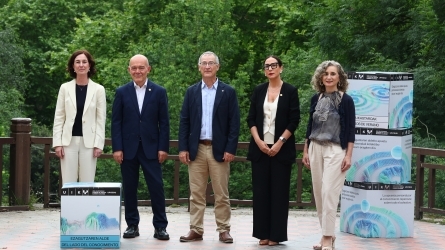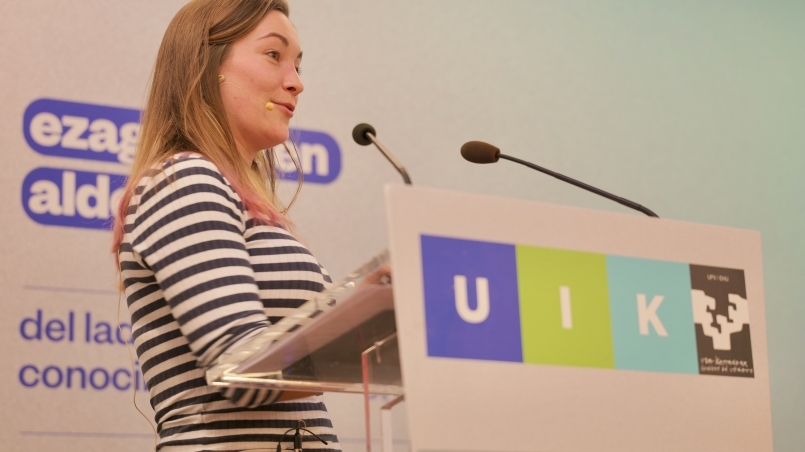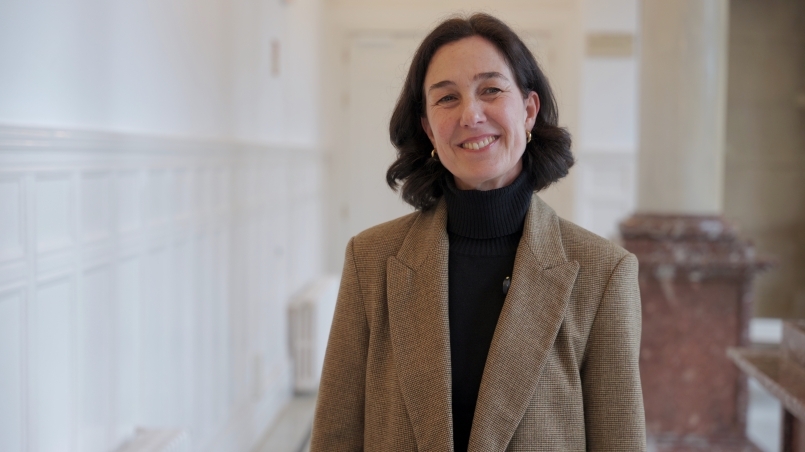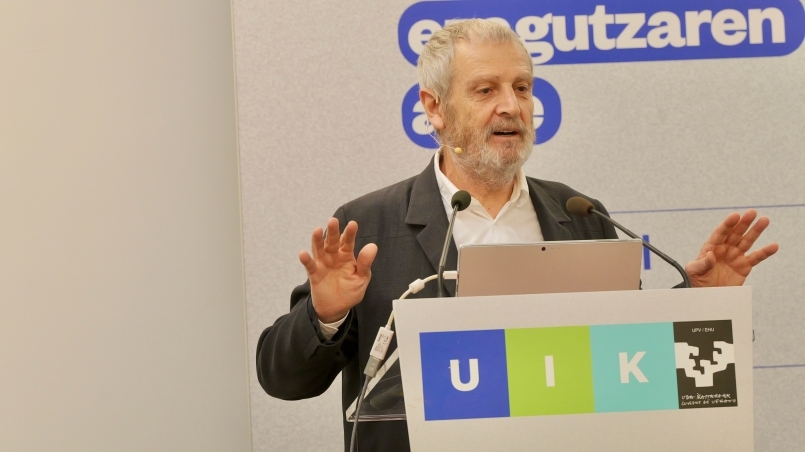Enrolment now open for the UPV/EHU Summer Courses
In their 44th edition, the UPV/EHU Summer Courses reaffirm their strong dedication to knowledge as a driving force for meaningful social change. This year’s programme places special emphasis on essential values such as peaceful coexistence, democratic culture, inclusive participation, collective responsibility, and the power of working together.
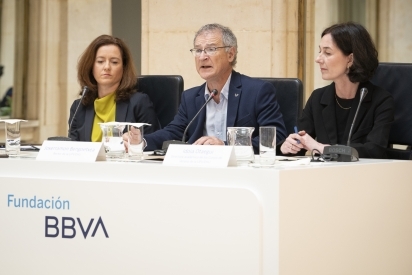
The official presentation of the 44th UPV/EHU summer courses was held at the BBVA Foundation headquarters in Bilbao today. During the event, Joxerramon Bengoetxea, the Rector of the UPV/EHU, Laura Poderoso, Deputy Director of the BBVA Foundation, and Idoia Otaegui, the Academic Director of the Summer Courses, went over details of the programme and the new features for 2025.
There are 152 Summer Courses and 14 workshops on the programme that will run from early June to late September. The greatest number of activities will be held in Donostia-San Sebastián, Bilbao, Vitoria-Gasteiz and Bayonne, in that order. The Summer Courses will also be taken to Ataun, Auritz-Burguete, Azkoitia, Beasain, Elgoibar, Gernika-Lumo, Ispaster, Miñano Menor, Mutiloa, Lekeitio, Lesaka, Oñati, Zerain and Zubieta.
Joxerramon Bengoetxea, Rector of the UPV, stressed that ‘committing to knowledge is ever more important in the times in which we live. Furthermore, that commitment makes the difference. And at a time when even scientifically-based verified data is questioned and unsubstantiated arguments are rampant, continuing to advance knowledge is essential’.
UIK, a meeting point for reflection and to disseminate knowledge
Thanks to the extensive experience of the UPV/EHU Summer Courses Foundation (UIK) and to the cooperation network with an array of entities and individuals working in the field of knowledge, the Summer Courses have become a benchmark for dissemination, debate and reflection around society’s challenges, and they offer a first-rate educational programme each year.
Alliances are a strategic aspect for UIK; therefore, the strong and ongoing commitment of the Basque Government, Gipuzkoa Provincial Government, Donostia City Council and the BBA Foundation with the project is essential.
Laura Poderoso, Deputy Director of the BBVA Foundation, pointed out that “for the BBVA Foundation, supporting the UPV/EHU Summer Courses is a commitment to a space representing essential values for society: critical thought, equitable access to knowledge and giving impetus to engaged, informed and educated citizens. This edition - the 44th - is further proof that UIK not only continues to be driven by public service, but it has once again reinvented itself to meet the main challenges of our time. Sustainability, coexistence, artificial intelligence and education transformation are issues modelling the present and that will condition our common future’.
The UIK’s main objective is to gather together people from all spheres of society and citizens as a whole to enable the intersection of the different types of knowledge. Academics, scientists, entrepreneurs, professionals, representatives and workers of the Administration, social stakeholders and people of different generations are invited to take part in the knowledge space; an interesting programme with something for everyone has therefore been designed in conjunction with multiple stakeholders.
According to Idoia Otaegui, the UIK Academic Director, ‘our goal is to gather knowledge activists in person and call on them to progress towards critical and true objective information, while recognising that individual commitments to knowledge impact the whole. This is the idea that we wish to convey through the image and message of this year’s campaign. With that in mind, we have designed an ambitious and contemporary programme, convinced that it will trigger enriching reflections and discussions that will allow us to advanced both individually and collectively and as a society’.
Programme structured in strategic cycles.
Starting from the current challenges, the Summer Courses will address a wide range of topics. They are organised into strategic cycles, with special emphasis on those related to Culture and Art, as well as to Society, Health, Education, Law, Economics and Business, and Science and Technology.
Coexistence, a great challenge of our time
Reflecting the current geopolitical situation, the values of coexistence, democracy, participation, community and teamwork will be very present, either in a cross-cutting manner or explicitly, in the content of the 2025 Summer Courses. Furthermore, sustainability and artificial intelligence will continue to be fundamental topics for reflection and debate.
The main thematic cycles for 2025 and some of their courses are summarised below.
UIK recognises that education linked to culture and art offers people the opportunity to develop sensitivity, innovation and critical thought, which are essential qualities in any field. This conviction is clearly reflected in this year’s courses.
Among the course offerings available, the role that linguistic diversity plays in sustainable development will be analysed, with special attention to the Basque context, on Culture, the Basque Language and Sustainable Development: Towards a Common Future. The space that has traditionally showcased leading artistic figureheads will mark the anniversary of the death of Koldobika Jauregi, when the artistic, social and cultural perspectives of his career will be considered. The work of Gabriel Aresti will also come under the spotlight in the context of the 50th anniversary of his death; the 150th anniversary of the birth of Maurice Ravel will be marked by an interdisplinary exploration of his musical legacy and his creative identity.
Along with culture and art, different courses on heritage, architecture and urban planning will be run. In a parallel cycle, the content of the programme will be linked to linguistics and literature, whose highlights will include HIGA – International Summit of Young Speakers of Minority Languages; a course focused on the 1992 European Charter for Regional or Minority Languages ; and literary writing workshops run by the authors Mariasun Landa and Luisa Etxenike.
The Summer Courses programme will include a wide offering on social issues. Against a backdrop of mounting tensions, the way in which peace is currently perceived will be discussed in the course entitled Visions of Peace and the Role of the European Union in a Multipolar World. The role that the European Union plays – or should play – in constructing and furthering peace in the contemporary international system will be critically discussed there.
In that same vein, the Gaza and Columbia: Starvation as a Weapon of War, the Food Security Factor of Peace course will analyse the dynamics and ramifications of the relationship between conflict and hunger, along with the fundamental role of food security in consolidating peace.
As regards youth emancipation, key aspects such as accessing housing, training and employment will be addressed. From a feminist perspective, a course will be run based on the research of María Dolores Juliano Corregido, a leading Argentine social anthropologist and a trail-blazer in feminist anthropology, focused on women belonging to marginalised social sectors.
Furthermore, the conditions of care and domestic work will be among the matters discussed and the public strategies aimed at guaranteeing rights and improving working conditions will be analysed.
Lifelong learning in the field of health is a key tool to adapt to medical advances and to contribute, in the long term, to improving quality of life. Particularly relevant and topical areas will be addressed during this year’s Summer Courses. The understanding of fentanyl will be furthered regarding its pharmacological use and its growing presence as a drug of abuse; the benefits associated to the development of palliative care will be highlighted; and strategies will be discussed to shed light on and prevent suicide, along with appropriately dealing with the mourning processes.
Furthermore, the key role that the pursuit of sport can play in promoting the holistic health of women – physical, nutritional and mental – will be analysed in depth, among other aspects.
In a parallel, a cycle of courses focused on the field of psychology and psychiatry will be run. One of the highlights will be the hosting of the XXIX Centennial Conference of the Spanish Association of Neuropsychiatry (AEN-PSM) under the tag line The Paradigm of Complexity. This meeting seeks to advance in the understanding and the empathetic support of individuals suffering mental pain, consolidating a supportive and inclusive approach.
Professionals from the field of education will find a varied and rich offering of courses for their ongoing training. Key pointers will be offered to mentor children and young people in educational processes in contact with nature, contemplating different dimensions and contexts. In the field of physical education, the relevance of cooperative motor situations and cooperative learning in the motor behaviour of the students in the fostering of positive interpersonal relations and in encouraging inclusion will be addressed.
As regards inclusive education, models, challenges and opportunities linked to vocational education and training for students with cognitive functional diversity will be analysed. Furthermore, the Body Diversity, Key for Coexistence course will explore issues such as the stigma related to weight, diversity, acceptance and body empowerment.
On the other hand, essential tools will be provided to mentor young people in the development of their sexuality based on trust, safety and respect. Finally, the ethical use of artificial intelligence and the possibilities offered by its different applications and tools will be considered in great depth, among other aspects.
Lifelong learning in the legal field is essential to adapt to the constant social and legal changes. In this vein, the Vitoria-Gasteiz International Relations and International Law Courses have been organised and will address highly topical and relevant subjects.
Furthermore, a course will be run focused on The Major Current Challenges of the European Union, along with another one that will analyse the content and significance of the new Pact on Migration and Asylum, both in the legal framework of the Union itself and in that of the Member States.
On the hand, there will be a space to reflect on the current evolution and situation of self-government, and a forum will be held to examine the agenda of challenges facing the Basque and European parliaments in the 21st century, thus fostering the sharing of institutional best practices.
Moreover, other highly topical legal issues will be addressed, such as the ramifications of neurorights, implementing robust and effective compliance programme, and the challenges raised by artificial intelligence in terms of human rights and data protection.
In parallel, there will be a programme specialised in the field of criminology, which will round off this cross-cutting offering with a clearly practical approach.
The Summer Courses will address different perspectives of the economy and business from a critical and holistic approach. From a reflective perspective, the different dimensions of capitalism will be analysed in order to understand their contradictions as a social reproduction system.
As regards the business fabric, accessible initiative and strategies aimed at improving resilience and the competitiveness of small and medium-sized enterprises will be studied, with special attention focused on strategic sectors of the Basque economy such as the automotive industry, machine tooling, steel, wine and txakoli wine.
With respect to the textile industry, and the fashion sector in particular, the main challenges regarding reusing and recycling will be examined, along with solutions driving the transition towards circular and social economy models.
On the other hands, the importance of the FABLABs beyond the urban environmental will be highlighted among the courses focused on the economy and business; their potential to contribute to sustainable development in rural areas and in the outskirts of the cities will be stressed.
The advances in science and technology will have a key spot on the Summer Courses programme. artificial intelligence (AI), with its opportunities and risks, will be one of the core areas of the 2025 courses. The transformative role that AI can play in the life of people with disabilities will be analysed; tools and knowledge to incorporate Generative AI in order to drive innovation in different business sectors will be offered; and the other areas will include delving further in the impact of Generative AI and of other emerging technologies on vulnerable communities.
Two specific courses will be run on mobility. One of them will focus on the new urban logistics technologies and innovative models aimed at great efficiency; the other will provide a current and comprehensive view of the situation of the Sustainable Urban Mobility Plans and their contribution to improving the quality of life in cities.
In other knowledge areas, the quantum computing course will provide a comprehensive view of its rationale and most recent technological developments. Furthermore, tools based on information systems to prevent or mitigate the consequences of natural disasters will be addressed.
Sustainability is a cornerstone of today’s society and will be one of the priority and cross-cutting subject areas in the Summer Courses. This theme will be addressed from multiple perspectives, with the aim of generating reflection and knowledge around the main contemporary challenges.
Sustainable and innovative solutions will be analysed to adapt cities to climate change and, in particular, to heat waves. Furthermore, the main challenges of climate change adaptation in the agricultural sector will be considered. An Advanced Environmental Measurement School, aimed at providing a diagnosis of the state of the environment in the Basque Country, will be held.
Furthermore, the key points of strategic communication in environmental and climate activities will be addressed; the relationship between consumer patterns and their impact on the environment, with special attention on the role of the primary sector, will be considered.
UIK continues to be firmly committed to sustainability. Beyond the academic programme, activities open to the general public will be organised in the Donostia Sustainability Forum (DSF), a permanent forum launced in 2020.
UIK in the world
UIK considers international outreach to be a key strategy in knowledge transfer. The participation of experts and students from abroad provides added value to the UIK academic activity and that is reflected in numerous courses included in this year’s programme.
Law courses focused on international relations will be run; there will be contributions from international experts to delve further into the democratic innovation processes; the Nazi deportation camps in Europe will be studied from a global perspective; and an international meeting on models to build sustainable cities will be held. A course for young people of the Basque Diaspora will be run and will be an opportunity to learn more about the theory and practice of Basque traditional dancing.
HIGA, a five-day international meeting for young speakers of minority language, will also be held; its aim is to drive linguistic revival and foster cooperation between different linguistic communities globally.
In addition to the Summer Courses, UIK organises specialist training sessions throughout the year and activities featuring leading international experts will be held during the summer season.
Special mention should also be made of the IV Cross-Border Summer Courses to be held in Bayonne, in conjunction with different universities and institutions. In the same way as in other Euroregions, this initiative seeks to open up new avenues to share knowledge and foster territorial cohesion, in order to provide a joint response to future challenges.
Encouraging participation
The majority of the courses will be in person; however, there will also be the possibility in many cases to take part in the live online format. Beyond the traditional model, over twenty of the Summer Courses will use participatory and innovative methodologies, with the aim of enriching the students’ learning experive.
Five of those courses will be part of the TopaGune project, an initiative rolled out with the backing of Gipuzkoa Provincial Government and which fosters collective reflection and meeting spaces.
Furthermore, some courses will provide learning based on direct experience. That is the case of the course on the artist Koldobika Jauregi, which will include a visit to the Ur mara Museum. During the Art and Astronomy course, practical sessions will be run in which students will learn to build an astrolabe, use a planisphere and explore astronomy applications; students will also be taught how to use the telescope and there will be a solar observation.
This activities bolster the UIK commitment to transformative and dynamic learning and open to the active participation of the students.
Enrolment open
- Enrolment is now open and people have until the start of each course to sign up.
- Period: from 8 May to the start of each course.
- Registation: www.uik.eus
- Information on the UPV/EHU Summer Courses: www.uik.eus
As regards the discounts available, different groups are entitled to lower rates for the course enrolments and accommodation. In addition to the general information, the specific fact sheet for each course contains all the details.
There is a special promotion to encourage young people aged 18 and 25 years to sign up: if they enrol before 30 June, most of the courses are available for just €25.
